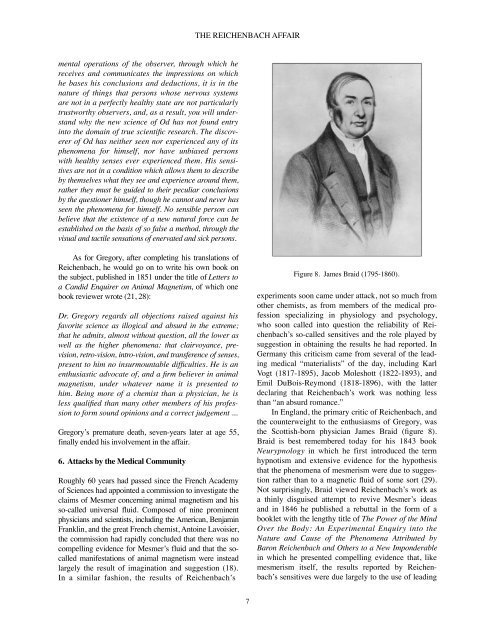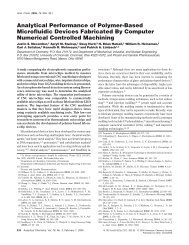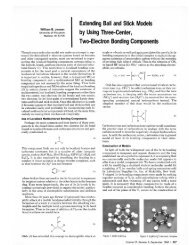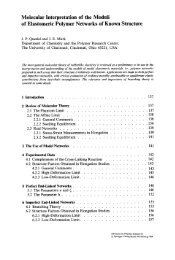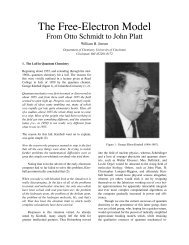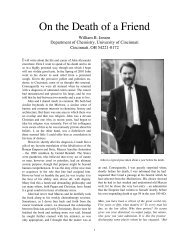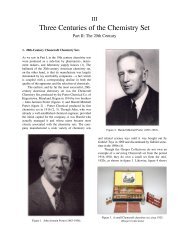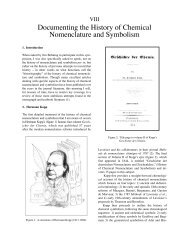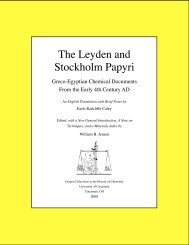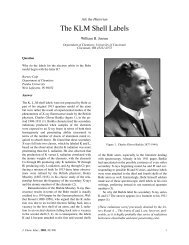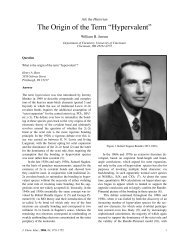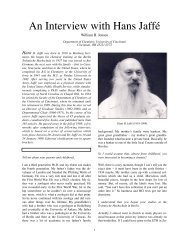Frankenstein's Cat.pdf - University of Cincinnati
Frankenstein's Cat.pdf - University of Cincinnati
Frankenstein's Cat.pdf - University of Cincinnati
You also want an ePaper? Increase the reach of your titles
YUMPU automatically turns print PDFs into web optimized ePapers that Google loves.
THE REICHENBACH AFFAIR<br />
mental operations <strong>of</strong> the observer, through which he<br />
receives and communicates the impressions on which<br />
he bases his conclusions and deductions, it is in the<br />
nature <strong>of</strong> things that persons whose nervous systems<br />
are not in a perfectly healthy state are not particularly<br />
trustworthy observers, and, as a result, you will understand<br />
why the new science <strong>of</strong> Od has not found entry<br />
into the domain <strong>of</strong> true scientific research. The discoverer<br />
<strong>of</strong> Od has neither seen nor experienced any <strong>of</strong> its<br />
phenomena for himself, nor have unbiased persons<br />
with healthy senses ever experienced them. His sensitives<br />
are not in a condition which allows them to describe<br />
by themselves what they see and experience around them,<br />
rather they must be guided to their peculiar conclusions<br />
by the questioner himself, though he cannot and never has<br />
seen the phenomena for himself. No sensible person can<br />
believe that the existence <strong>of</strong> a new natural force can be<br />
established on the basis <strong>of</strong> so false a method, through the<br />
visual and tactile sensations <strong>of</strong> enervated and sick persons.<br />
! As for Gregory, after completing his translations <strong>of</strong><br />
Reichenbach, he would go on to write his own book on<br />
the subject, published in 1851 under the title <strong>of</strong> Letters to<br />
a Candid Enquirer on Animal Magnetism, <strong>of</strong> which one<br />
book reviewer wrote (21, 28):<br />
Dr. Gregory regards all objections raised against his<br />
favorite science as illogical and absurd in the extreme;<br />
that he admits, almost without question, all the lower as<br />
well as the higher phenomena: that clairvoyance, prevision,<br />
retro-vision, intro-vision, and transference <strong>of</strong> senses,<br />
present to him no insurmountable difficulties. He is an<br />
enthusiastic advocate <strong>of</strong>, and a firm believer in animal<br />
magnetism, under whatever name it is presented to<br />
him. Being more <strong>of</strong> a chemist than a physician, he is<br />
less qualified than many other members <strong>of</strong> his pr<strong>of</strong>ession<br />
to form sound opinions and a correct judgement ...<br />
Gregory’s premature death, seven-years later at age 55,<br />
finally ended his involvement in the affair.<br />
!<br />
6. Attacks by the Medical Community<br />
Roughly 60 years had passed since the French Academy<br />
<strong>of</strong> Sciences had appointed a commission to investigate the<br />
claims <strong>of</strong> Mesmer concerning animal magnetism and his<br />
so-called universal fluid. Composed <strong>of</strong> nine prominent<br />
physicians and scientists, including the American, Benjamin<br />
Franklin, and the great French chemist, Antoine Lavoisier,<br />
the commission had rapidly concluded that there was no<br />
compelling evidence for Mesmer’s fluid and that the socalled<br />
manifestations <strong>of</strong> animal magnetism were instead<br />
largely the result <strong>of</strong> imagination and suggestion (18).<br />
In a similar fashion, the results <strong>of</strong> Reichenbach’s<br />
Figure 8. James Braid (1795-1860).<br />
experiments soon came under attack, not so much from<br />
other chemists, as from members <strong>of</strong> the medical pr<strong>of</strong>ession<br />
specializing in physiology and psychology,<br />
who soon called into question the reliability <strong>of</strong> Reichenbach’s<br />
so-called sensitives and the role played by<br />
suggestion in obtaining the results he had reported. In<br />
Germany this criticism came from several <strong>of</strong> the leading<br />
medical “materialists” <strong>of</strong> the day, including Karl<br />
Vogt (1817-1895), Jacob Moleshott (1822-1893), and<br />
Emil DuBois-Reymond (1818-1896), with the latter<br />
declaring that Reichenbach’s work was nothing less<br />
than “an absurd romance.”<br />
! In England, the primary critic <strong>of</strong> Reichenbach, and<br />
the counterweight to the enthusiasms <strong>of</strong> Gregory, was<br />
the Scottish-born physician James Braid (figure 8).<br />
Braid is best remembered today for his 1843 book<br />
Neurypnology in which he first introduced the term<br />
hypnotism and extensive evidence for the hypothesis<br />
that the phenomena <strong>of</strong> mesmerism were due to suggestion<br />
rather than to a magnetic fluid <strong>of</strong> some sort (29).<br />
Not surprisingly, Braid viewed Reichenbach’s work as<br />
a thinly disguised attempt to revive Mesmer’s ideas<br />
and in 1846 he published a rebuttal in the form <strong>of</strong> a<br />
booklet with the lengthy title <strong>of</strong> The Power <strong>of</strong> the Mind<br />
Over the Body: An Experimental Enquiry into the<br />
Nature and Cause <strong>of</strong> the Phenomena Attributed by<br />
Baron Reichenbach and Others to a New Imponderable<br />
in which he presented compelling evidence that, like<br />
mesmerism itself, the results reported by Reichenbach’s<br />
sensitives were due largely to the use <strong>of</strong> leading<br />
7


